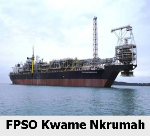Lequified Natural Gas (LNG) is the way ...Energy Ministry declares
- Details
- Created on Saturday, 28 September 2013 07:56
The Energy Ministry has agreed with players in the power sector that the country must consider importing Liquefied Natural Gas (LNG) for power generation.
The ministry has therefore initiated discussions on the matter with international LNG experts and government representatives from Togo and Benin, countries that rely on Ghana for power.
“As a ministry, we have come to the same conclusion that Industry (both private and public) has reached. Our clear preference is to encourage the development of an LNG importation and regasification business in Ghana. We are particularly interested in the use of Floating Storage and Regasification technology,” John Jinapor, Deputy Energy Minister, said at a two-day LNG conference in Accra.
While it does not want to directly import, build or own the LNG infrastructure, the government says it will support it with a clear fiscal and regulatory regime, technical capacity-building for LNG stakeholders, and engage friendly LNG-exporting governments to have supply agreements with off-takers in Ghana.
“It is for business entities to take a view on the feasibility and risks of LNG and develop the business strategies and structure the complex commercial arrangements require to make things happen. As I understand it, there are several different configurations that would allow power producers acting collectively to import and re-gasify LNG for their uses,” Mr. Jinapor said.
LNG is natural gas that has been converted to liquid form, usually for ease of storage or, in this case, transportation. Bringing in LNG will first require the setting-up of a regasification facility.
As it tries to increase its power generation from a little over 2,000 megawatts to 5,000 megawatts by 2016, the country is in a frantic search for alternative sources of fuel. Although gas supply has resumed from the West Africa Gas Pipeline, supply is said to be below the contractual volumes: WAPCo currently delivers about 70 million standard cubic feet of gas out of a scheduled 123 million.
It is also not certain when gas from the country’s own Jubilee oil field will be available, as several deadlines for completion of work on the gas-processing plant have been missed.
Aside from Jubilee, the country is expecting gas from other fields like Sankofa and the TEN project area. In the medium- to long-term, however, the Energy Ministry says local gas supply will still not meet the demand even if all these projects come on board.
Meanwhile, the country is said to have almost exhausted its hydropower potential with Bui coming on stream; this means a shift toward thermal power, which requires either crude oil or gas.
But crude oil is about twice as expensive, and the Volta River Authority has been struggling to come up with the money to buy crude for its thermal plants.
Independent Power Producers (IPPs) have indicated that if they are incentivised they can fill the energy demand gap. The Energy Commission has currently issued provisional licences to about 17 IPPs for thermal power generation. When put together, these IPPs will provide 5,336 megawatts of power, which could take care of the government’s 2016 projections. None of these projects has, however, started -- and whether they can get fuel could prove to be the most critical factor.
According to the Energy Ministry, an LNG Floating Storage and Regasification Unit (FSRU) will remove the immediate fuel constraints to optimum expansion of the power generation capacity in the country in the medium- to long-term.
“Even using spot prices, LNG could mean a 20% reduction in fuel costs to the power industry or savings of US$2billion over a 10-year period. For the industry as a whole, this is enough to fund one 400 MW power plant every other year.
“Further, an FSRU-based LNG solution is sufficiently flexible; such that if in 10 years there is sufficient indigenous and regional piped gas available in the Ghana market, the unit can either be towed away for use elsewhere or (assuming full capital cost recovery) kept in service to strengthen the sector’s resilience,” the ministry said.
By Basiru ADAM, B&FT






